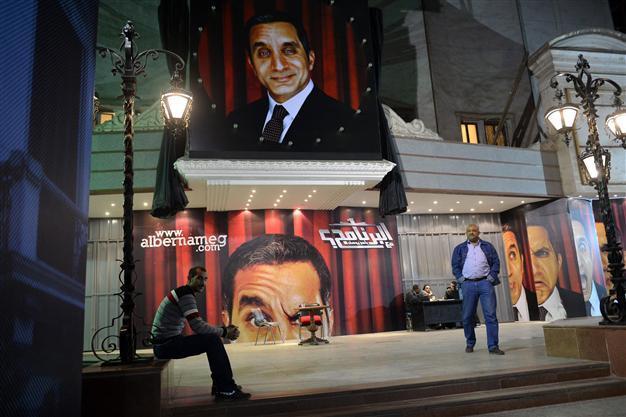Egypt prosecutor orders arrest of popular satirist
CAIRO - Agence France-Presse

A picture taken on January 22, 2013 shows Egyptians walking past posters of Egyptian satirist Bassem Youssef outside a theatre in Cairo. Egypt's public prosecutor ordered the arrest of Youssef over alleged insults to Islam and to President Mohamed Morsi, state news agency MENA reported on March 30. AFP photo
Egypt's public prosecutor on March 30 ordered the arrest of popular satirist Bassem Youssef over alleged insults to Islam and to President Mohamed Morsi, in the latest clampdown on critical media.
Judicial sources told AFP that several complaints had been filed against Youssef, whose razor-sharp humour -- delivered on his weekly television programme Albernameg (The Show) -- has spared few public figures.
He is accused of offending Islam through "making fun of the prayer ritual" on his show, and of insulting Morsi by "making fun of his international standing," the sources said.
In one of the suits filed against him, the plaintiff asked that legal measures be taken against Youssef so as not to encourage others to follow his example, a source said.
In typically manner, Youssef confirmed a warrant had been issued against him. "The warrant against me is true. I will head to the public prosecutor's office tomorrow unless they send me a police car today and help me save on transport," he wrote on his Twitter account.
Dubbed the Egyptian answer to American television's Jon Stewart, the heart surgeon turned comedian has repeatedly poked fun at the ruling Islamists and Morsi in particular.
He shot to fame after starting his satirical show on the Internet shortly after the 18-day uprising which toppled Hosni Mubarak in 2011, attracting over five million views after only seven episodes.
He was signed up by private satellite television channel ONTV, before moving to another channel, CBC, to become the first Egyptian television show to be filmed before a live studio audience.
Youssef and his cast of sidekicks have become household names in Egypt with their merciless critique of public figures and fearless humour.
Perhaps the biggest appeal has been Youssef's ability to hold a mirror up to those in power, starting with Mubarak's entourage, followed by the military council that ruled after his ouster and finally Morsi who was elected last June.
But post-revolutionary media freedoms have proved no laughing matter. Youssef now joins the ranks of several colleagues in the media who face charges of insulting the president.
The soaring number of legal complaints against journalists has cast doubt on Morsi's commitment to freedom of expression -- a key demand of the popular uprising that toppled Mubarak.
Under Egypt's legal system, complaints are filed to the public prosecutor, who decides whether there is enough evidence to refer the case to trial. Suspects can be detained during this stage of investigation.
Rights lawyers say there have been four times as many lawsuits for insulting the president under Morsi than during the entire 30 years that Mubarak ruled.
Last week, an arrest warrant was issued for blogger Alaa Abdel Fattah for inciting unrest, while prosecutors said they would investigate three other high profile television hosts -- Lamees al-Hadidi, Amr Adeeb and Youssef al-Husseini -- over incitement.
The Committee to Protect Journalists has slammed the tactics used against critical media. "Those in media are already coming under pressure from inflammatory, anti-press comments by Morsi" and members of his Muslim Brotherhood movement, said Sherif Mansour, CPJ's Middle East and North Africa Programme Coordinator.
"And now they can witness how the law is being abused and the justice system bent backwards in order to silence them."
